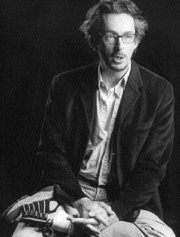DON JUAN
Seattle Center, Seattle Repertory Theatre, 443-2222, $10-$44 7:30 p.m. Tues.-Sun.; 2 p.m. matinees Sat.-Sun. ends Sat., April 13
STEPHEN WADSWORTH has made his name by listening to ghosts. As a translator and adapter, the director’s life’s work consists of taking the time to hear the resonant, lingering voices of some of theater’s past geniuses and to painstakingly reconstruct—and revitalize—the energies of their life’s work. His devotion to Marivaux was responsible for that 18th-century playwright’s re-emergence on modern-day stages; his sumptuous, dazzling version of The Game of Love and Chance a few seasons ago, which made harlequins and buffoons feel crucial again, remains one of the Rep’s grandest-ever offerings.
So Wadsworth’s ears perked up when Joan DeJean, a professor in romance languages at the University of Pennsylvania, brought him a rare, centuries-old Amsterdam edition of Moli貥’s Don Juan. In his take on the world’s most notorious lover, Moli貥, whose greater concerns were always slyly woven into the fabric of a wicked romp, used the lothario as a mouthpiece for his typically scathing examination of socio-political mores—and this time his wit did not pass with just a lascivious chortle. The play incensed its privileged audience and was promptly censored and banned in France after its opening-night offense in 1665. The Amsterdam text is most likely the result of what was a common practice known as “memorial reconstruction”— culled (almost 20 years later) from people who had witnessed the initial performance in order to write it down from memory. In a brief interview following last week’s preview performances at the Rep, Wadsworth discusses the need to commune with the spirits of geniuses, and teases us with hints of what makes Don Juan more than just another ladies’ man.
Seattle Weekly: What specific quality made the original version such an outrage at the time?
Stephen Wadsworth: Let’s put it this way—the original performance introduced into public discourse several topics that were taboo. The main one is hypocrisy in the church and in the government. There were lots of comments about the role of religion in society and the existence of God at all, which is roundly questioned by Don Juan. And then there were various kinds of comments about the social contract and the political exigencies of life in that time. But the lowest, deepest issue is the issue of hypocrisy in all the structures that are supposed to protect public good—the church, the state. . . .
But wasn’t hypocrisy something Moli貥 often dealt with in his plays?
That’s right: The Misanthrope, Tartuffe. . . . He’d just written Tartuffe and it had been played at a big festival, and it was really violently objected to by a particular organization of the religious right at the time [and withdrawn]. . . .
So why was Don Juan less acceptable? The text of Tartuffe didn’t disappear like this one did. . . .
No, it didn’t, because this one was even more out there. I mean, the speech that Don Juan gives at the end of the play—when you hear that speech sitting in a theater, all of this comes together. You just sort of go, “Oh, my God.” [laughs]
How much of your own aesthetic concerns do you allow yourself to bring into a translation?
I do a literal translation, but then I adapt the play. First of all, I don’t deal with any material that I don’t feel agrees aesthetically with me. Obviously, I have to let myself into the work that I’m doing, right? I can’t hold back and be all prissy and careful; I have to let myself rip into it in order for it to really fly. I have to feel like my own concerns—not so much aesthetically, but as a writer, as someone with something to say—are in sync with, or are actually the same as, the dead people I’m working with. Because it’s definitely a live connection with a dead person. It’s hard to describe that, but it’s the real center of my life as an artist. People say, “What’s it like dealing with dead playwrights?” And I say, “Oh, they’re not dead.” You know, you have to commune with them in some way. So, I think that’s my real answer—obviously, I’m a big ol’ personality, and there’s gonna be stuff that gets in the play from me, and I have to be secure in the initial pact that I have with the playwright that that’s OK.
Outside of the obvious theatrical scholarship, what should be most vital to us about Don Juan?
Well, Don Juan is a great masterpiece. So we don’t have to worry about what should be vital to us—it’s gonna deliver. I think that there is a great deal in the play which feels remarkably current; I think that politically it will feel live. Last night at the preview, during one of the places where [Don Juan] is talking about God and Christian thought, there was a big round of applause after a certain key line, and it was very clear that the applause was from both sides [of the debate]. But I have a little trouble with [your] question, because I think by saying that it’s a very great play that speaks to a lot of things . . . for me, that’s enough.








